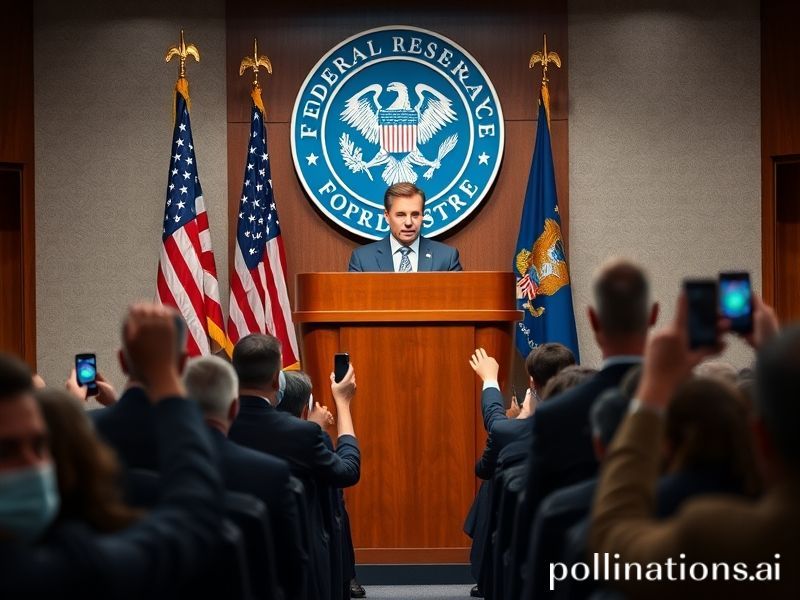Planet Earth Holds Breath as Powell Speaks: A Global Tour of Faint Hope & Controlled Panic
Jerome Powell took the virtual podium today, and every time zone from Tokyo to Tierra del Fuego leaned in like anxious relatives eavesdropping on the will-reading. The Fed Chair’s semi-annual testimony before Congress is traditionally a Washington ritual, but in 2024 it feels more like a planetary seance: traders in Singapore, pension funds in Oslo, and crypto bros in Dubai all holding their breath to see which way the interest-rate Ouija board will twitch.
The ostensible topic was “monetary policy,” that deliciously bloodless phrase that nonetheless decides whether your cousin in Lagos can afford diesel or your barista in Lisbon still has a job. Powell’s script was the usual blend of bureaucratic poetry—“data-dependent,” “cautiously optimistic,” “proceed carefully”—delivered with the enthusiasm of a man reading the safety card on a crashing plane. The headline takeaway: no immediate pivot, but maybe, possibly, a rate cut later this year if inflation behaves like a disciplined child and the labor market stops flirting with overtime orgies.
Cue the synchronized spasms. The dollar dipped 0.3% against a basket of currencies, which sounds trivial unless you’re a Turkish importer watching the lira do its weekly limbo. European bond yields sighed downward, relieved that the world’s reserve currency won’t suddenly start sucking capital across the Atlantic like a Dyson on steroids. Meanwhile, China’s yuan—still recovering from its own property-sector autopsy—inched up just enough for state media to declare victory over “irrational foreign speculation,” a phrase that roughly translates to “we’re fine, shut up.”
Emerging markets exhaled a collective, if cautious, sigh. From Jakarta to Johannesburg, central bankers have spent the past two years playing whack-a-mole with capital flight every time Powell so much as cleared his throat. Brazil’s real actually strengthened, which economists attribute to “carry-trade optimism” and regular Brazilians attribute to “another day without a coup.” The South African rand, ever the drama queen, celebrated by weakening slightly anyway, because hope is for tourists.
Europe, meanwhile, is stuck in its own tragicomedy. The ECB has been tightening like a Victorian corset, praying inflation falls before the entire continent starts burning furniture for warmth. Powell’s dovish-ish tone gives Christine Lagarde a tiny bit of daylight to pivot without looking like she’s merely Xeroxing Washington. Still, German carmakers—still digesting their self-inflicted Betrayal-of-the-Internal-Combustion-Engine saga—would prefer a weaker euro so they can export contrition at a discount.
Back in the States, the political peanut gallery erupted on cue. Progressives demanded lower rates yesterday to keep the illusion of a painless green transition alive. Conservatives warned that any cut would unleash hyperinflation and turn America into Weimar with Wi-Fi. Both sides agree on only one thing: whatever happens, it’s definitely the other party’s fault, and the Fed should probably fix student loans, housing, and male pattern baldness while it’s at it.
Yet the real audience sits far from the Potomac. In Cairo, where imported wheat prices can topple governments, Powell’s words are parsed like Talmudic texts. In Seoul, chip exporters do the mental math: stronger won equals thinner margins equals fewer late-night karaoke sessions with suppliers. And in Buenos Aires, where inflation is already measured in “peronitos” (a new unit equal to the time it takes for a steak to double in peso price), citizens merely shrug: the Fed may set the world’s tempo, but Argentina long ago switched to freestyle jazz.
So what did Powell actually say? Nothing—and everything. He promised to watch the data, which is central-banker for “we have no idea either.” He warned that cutting too soon could rekindle inflation, while waiting too long could “cause undue harm,” a phrase economists translate as “recession” and everyone else translates as “you’re on your own, kids.” Markets rallied anyway, because in 2024 bad news is just good news wearing a fake moustache.
In the end, the globe’s fate still hinges on a committee of twelve people who sound like they’re narrating a golf tournament. The rest of us—importers, gig workers, oligarchs, and that guy in Nairobi trying to buy a used refrigerator—will continue to refresh our screens, praying the almighty dot plot smiles upon us. Until the next speech, humanity’s economic future remains exactly where it’s always been: somewhere between a spreadsheet and a séance.







